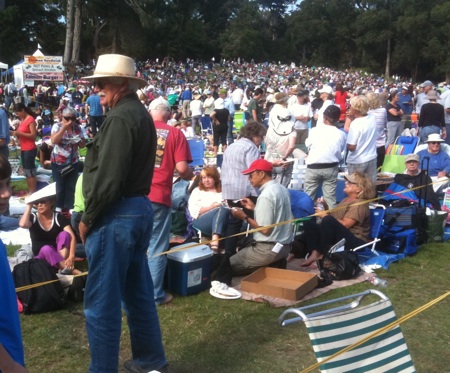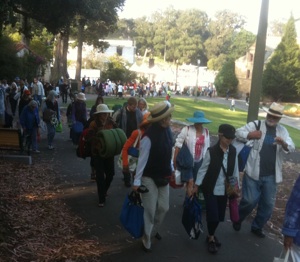The tenth anniversary of September 11 dawned cloudy in the Bay Area. In San Francisco thousands were lured to Sharon Meadows in Golden Gate Park by an offer of free opera, spreading blankets and hauling picnic baskets and wine. By two in the afternoon the last shreds of fog had burned off, giving a somber occasion a sunny patina.
Undampened by speeches from a long roster of public figures, the public milled about until the San Francisco Opera Orchestra began Mozart’s Requiem. Written for a disguised patron (and popularized by the film Amadeus), and with his own father’s recent death in mind, Mozart wrote eloquently, but did not finish the work before his own untimely death at 35. In fact, the moving Lacrimosa movement, which Mozart had sketched out, was played by his comrades at his own memorial.
The programming was meant to be a moving reinterpretation, interspersing movements of the Requiem with prayers from many religions. But the exhortations of the mayor and the fine singing of the Mass left the crowd somewhat cool. They only warmed twice: once for Melody Moore’s fabulous version of “Somewhere” from West Side Story, and again for tenor Marco Berti in an encore of “Nessun Dorma” from Turandot. And baritone Thomas Hampson’s version of “At the River” was a close third favorite.
Of course, several thousand people verging on sunstroke may have had something to do with the limp applause. Or perhaps the fault lay in the amplification, a necessary evil for these sorts of public events, and one with which engineers continue to struggle. The microphones seemed to over-amplify the crests, exaggerating the soloists’ vibratos to the point of caricature. Having heard Melody Moore on several occasions, I’m sure she doesn’t actually sound like a starter motor on a cold day.
But the tepid reception may have underscored a deeper issue—the lack of real meaning outside of the mourning process. In the ten years since that awful day there has been little introspection in the American psyche.
SF Mayor Edwin Lee said as much in his remarks: “A decade after the events of September 11 we continue to struggle to understand the events of that day.”
I well remember those moments. My parents lived in NYC and called that morning, as I readied my son for school. “Something’s terribly wrong,” my mother said. “Turn on your TV.” I did and we watched the second plane hit and the ensuing flames. As tiny bits fell from the buildings, I realized with horror that I was watching people leap to their deaths. We stood in the kitchen and cried.
As Mozart declined, he feverishly wrote his Requiem. In Tuba Mirum, the golden tones of a trumpet announced the opening of the gates of heaven, with bass soloist Ryan Kuster offering a graveled counterpart. Then the other three soloists joined in lovely fugue. Then in Rex tremendae the SF Opera Chorus showed its muscle in soft repetitions of salve me, save me.
I listened to the Lacrimosa, and its text of tears and ashes, and marveled at Mozart’s deep faith in humanity.
When one is closer to his vision and faith, one could respond to violence without hatred, but rather treat it as an ill. Perhaps, as award-winning British journalist Yasmin Alibhai-Brown urges, we can begin to acknowledge the roots of extremism in ordinary families, and shift our national dialogue away from stridency.
And so thousands of us prayed for insight in a sunny meadow, then applauded madly for an Italian tenor.

—Adam Broner
Photos from the concert.
